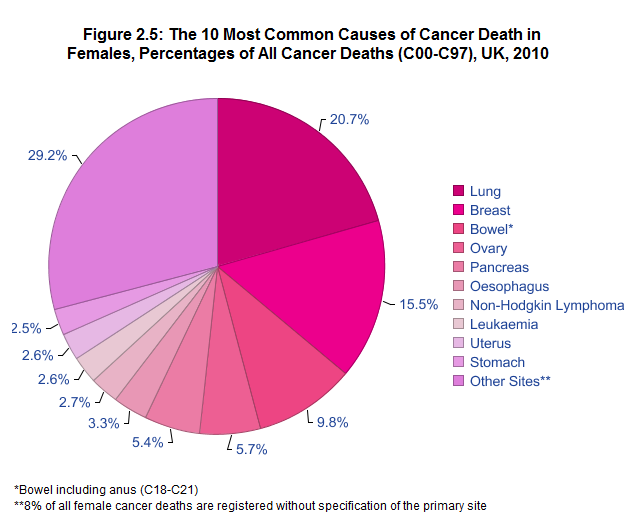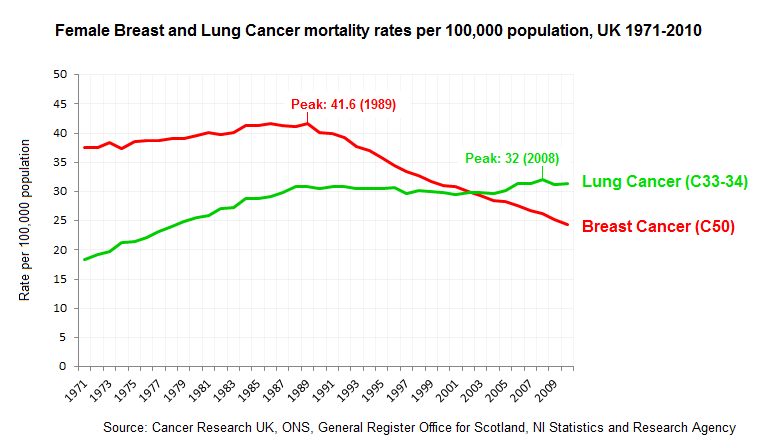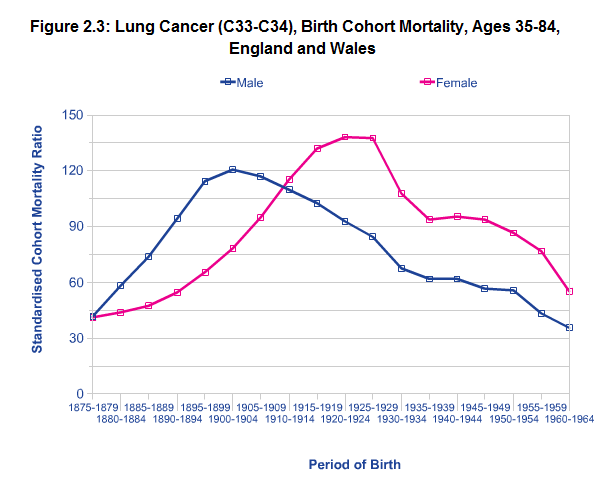Does lung cancer kill more women than breast cancer?
"Growing toll of smoking on UK women as it's revealed more die from lung than from breast cancer"
Daily Mail, 13 February 2013
"Lung cancer replaces breast cancer as the deadliest form of the disease for women in the UK"
Sky News, 13 February 2013
Research revealing that lung cancer deaths have overtaken breast cancer deaths in women seems to have taken aback today's papers. But is this a new phenomenon? And what does the data tell us?
"Lung cancer is now the biggest killer of women in the UK."
Among cancers, yes. But we don't need a journal study to prove it. The Office for National Statistics (ONS) break down the causes of registerd deaths in England and Wales, broken down by sex. The General Register Office for Scotland has the same for Scotland and the Northern Ireland Statistics and Research Agency tell us what's happening across the Irish sea.
Cancer Research UK compile cancer statistics from all three sources, so they're the best place to start. They confirm the summary figures: in 2010 lung cancer killed 15,449 women and 19,410 men in the UK. This was more than any other individual cancer for women, breast cancer fell in second place, having killed 11,556 women and 77 men.
Cancer Research UK illustrated the different rates on their site:

[N.B. The 'C' numbers are 'ICD-10' codes, according to the international classification of diseases]
Has this only just happened?
No. The journal article reported in the news today didn't use different data for the UK from what we've already looked at, and only commented that it was already the case that lung cancer was ahead of breast cancer as a cause of death here in the UK.
Using the same data as before, we can chart the mortality rates for breast cancer and lung cancer for UK women.
The graph below shows the trends since 1971:

Lung cancer overtook breast cancer for female mortality rates in 2002, although the change is still relatively recent. As is apparent, it's mainly driven by a fall in rates for breast cancer over the past two decades combined with a largely steady rate for lung cancer.
Why the change?
Cancer Research UK cites several likely causes for the reduction in breast cancer mortality: among them better detection, more specialised case and better access to more effective treatments. The journal study also links decreased use of Hormone Replacement Therapy (HRT) in some countries as a related phenomenon.
As for lung cancer, the picture is more complex. The journal article explored the issue, focussing on EU rates, where it concluded that:
"The steady increase in lung cancer mortality in women in the EU is expected to continue. Breast cancer rates are expected to still be higher than lung cancer rates in women in the EU in 2013, although the difference is small (14.6 versus 13.9/100 000 women). However, if the opposite trends in breast and lung cancer mortality rates continue in the near future, in 2015 lung cancer may become the first cause of cancer mortality in women as well [as men]."
The study analysed the growing trend in lung cancer rates by looking at the age cohorts of those dying of lung cancer - in other words, looking at when they were born and seeing if there was any correlation. It found that death rates increased in women born in the 40s, 50s and 60s, and declined more recently (the study points out this is based on small sample numbers).
For the UK, however, the highest mortality by birth cohort was for women born in the 1920s. Risk fell thereafter till a levelling out in the 1940s, and further declines later on.
Cancer Research UK's own compilations of the statistics back this up. The graph below demonstrates that while lung cancer peaked for men born at the turn of the 20th century, the peak for women came nearly a quarter of a century later:

As the journal study concludes:
"It is, therefore, possible that the recent increase in lung cancer mortality in UK women is transient [temporary], due to the additional rises in smoking prevalence observed in the 1970s; the favourable trends in younger women in the UK as well as in several other European countries suggest that a levelling off... and possibly some decrease in lung cancer mortality rates in EU women, could occur after 2020"
So there is, perhaps, some grounds for optimism in spite of the recent trends in female lung cancer.
---
Flickr image courtesy of TipsTimes